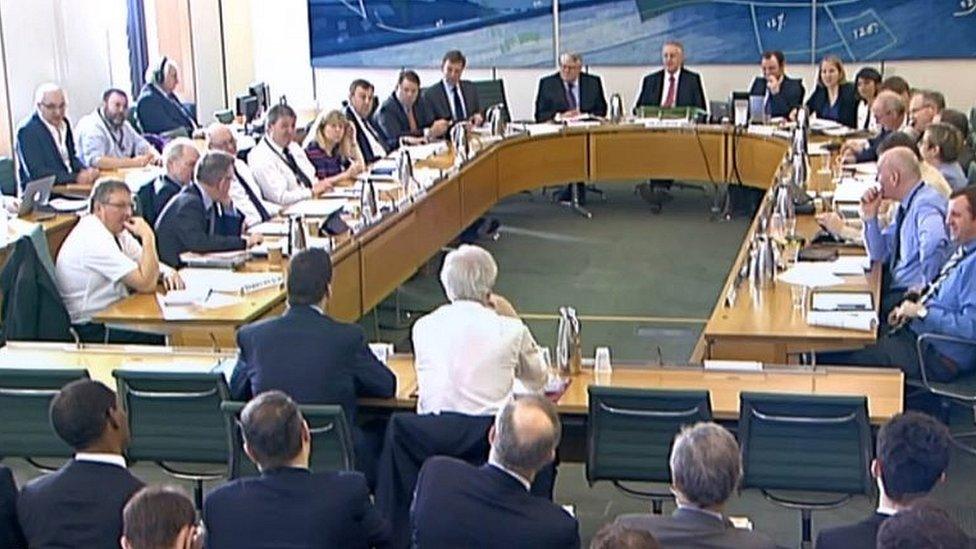Fragile unity of Brexit Committee dissolves
- Published
- comments

Oh dear. For a while the Commons super-select committee on Brexit, external has managed to defy predictions (mine included) that it would struggle to unite around strong conclusions and hard hitting reports.
Thanks to Hilary Benn's skilful chairing, it produced two tough reports on the status of EU citizens in the UK and of British residents in the EU, external, and on the government's negotiating objectives, with its Remain majority and Leave minority both signing up.
But 24 hours before the triggering of Article 50, this fragile unity dissolved, as the Brexiteer contingent - a minority on the committee, external - left the meeting, rather than fight what they regarded as an unduly gloomy report, by putting down line by line amendments to lighten that gloom.
It was not, incidentally, a coordinated walkout but a process of "drifting away".
There is an argument about process - with the Brexiteers complaining that they were presented with a fully worked-up 155 page draft report, which they regarded as unacceptably pessimistic, without being given an opportunity to shape the basic principles and arguments within it.
The Brexiteers suspect the committee chair "tried to pull a fast one".
Theresa May made a statement on Article 50 to the Commons on Wednesday
Some even suspect the intention was to inject a sour note into the ceremonial around the triggering of Article 50, although the report at the centre of the dispute is not due to be released into the wild until next Tuesday.
They also argue that their deliberations should have been postponed to allow the committee to mull over the contents of the PM's Article 50 Letter and the white paper foreshadowing the Great Repeal Bill, due on Thursday, and wonder why this wasn't done as a matter of course.
Thus perish months of painstaking consensus-building in a committee, which had a deep and obvious fault-line running through it, from the outset.
It is a considerable blow. Select committees are at their most effective when they are the product of genuine cross-party agreement. That is what makes ministers take notice.
The two top tips for reading any report are to check the formal minutes of the drafting meeting, to see if there were any contested votes or attempts to amend the text, and to look out for points where convoluted language has been employed to paper over disagreements.
In the case of BrexCom, the trick was a slightly different one - to reach consensus between Leave and Remain MPs, although party interests continue to lurk in the background.
So does this falling-out diminish the committee for the future?
If Leave MPs pull out of drafting its reports, do they become pure "Remain" documents, which can be dismissed as the product of a faction? The Remainers do wonder whether the whole exercise was designed to discredit the committee as an objective critic of the conduct of Brexit.
The good news is that the dispute has yet to become nasty - some select committees have become pretty snappy over the years, but the Brexit Committee has so far been fairly collegial, and I'm told today's meeting carefully avoided recriminations and focused on trying to get the show back on the road. But this may not be easy. The Leave MPs argue that the committee should not have a Remain majority; the Remainers say they have had to compromise their views too.
At the moment the Leave contingent (eight Conservatives, plus the DUP's Sammy Wilson) seem likely to register formal dissent from the official report produced by the committee, rather than grind out their own minority report.
But the credibility of future reports on such subjects as the forthcoming Great Repeal Bill are, even now, somewhat undermined.